VOTER GUIDE
 On Tuesday, June 30, Faith in Public Life and Interfaith Power & Light released a voter reflection guide endorsed by prominent national faith groups and religious leaders. The guide, Democracy, Values & the 2020 Election, addresses urgent issues in the election, including voting rights, climate change, systemic racism in the criminal justice system, healthcare and immigration. The guide, which will be distributed across the country for discussion in diverse faith communities, includes topics for reflection and sample questions to ask candidates Download Full Guide Here
On Tuesday, June 30, Faith in Public Life and Interfaith Power & Light released a voter reflection guide endorsed by prominent national faith groups and religious leaders. The guide, Democracy, Values & the 2020 Election, addresses urgent issues in the election, including voting rights, climate change, systemic racism in the criminal justice system, healthcare and immigration. The guide, which will be distributed across the country for discussion in diverse faith communities, includes topics for reflection and sample questions to ask candidates Download Full Guide Here
Download Spanish-language version of the guide, Democracia, Valores y las Elecciones de 2020
Issues and Questions
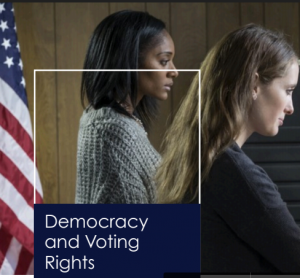 Democracy and Voting Rights (Page 1)
Democracy and Voting Rights (Page 1)
This election is more than a choice between parties and ideologies. An even more fundamental question is at stake: Can we preserve democracy in the face of serious threats to fair elections and fundamental rights?
Questions for Reflection and Candidates
- How do you see democratic values at risk today?
- How do systemic barriers to voting undermine our most sacred democratic values?
- How can your faith community better advocate for stronger voter protections at the state and local level?
- As a candidate, what are your specific plans for protecting and strengthening voting rights?
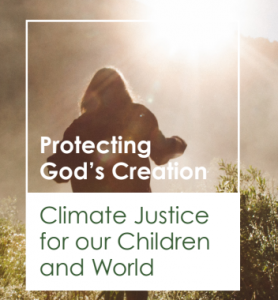 Protecting God’s Creation Climate Justice for our Children and World (Page 2)
Protecting God’s Creation Climate Justice for our Children and World (Page 2)
As people of faith, we believe that responding to the urgent threat of climate change is essential to caring for God’s creation and loving our neighbors. Human activity, primarily the burning of fossil fuels for energy, has thrown
nature out of balance, polluted the air, driven thousands of species of God’s creatures to extinction, intensified catastrophic events such as wildfires and hurricanes, and threatened the lives and livelihoods of our most vulnerable brothers, sisters and neighbors around the world. Scientists tell us we have less than a decade to avoid even more catastrophic consequences.
The United States has a unique responsibility to show moral and political leadership:
- Transitioning our economy away from polluting fossil fuels toward 100% clean energy.
- Honoring the emissions-reduction commitments our nation made at the UN Conference on Climate Change in Paris in 2015, and taking additional actions needed to avert catastrophic global warming.
- Assisting developing nations— who are least responsible for climate change but most impacted by it — in coping with threats such as increased droughts, disease, and sea-level rise by sharing technology and financial support.
Questions for Reflection and Candidates
- What does your faith teach about our responsibilities for the Earth and to others? How are they interdependent?
- Has your faith community made an effort to cut emissions, save energy, or practice environmental stewardship?
- As a candidate, what specific policies do you support to protect God’s Creation and secure a safe climate for our children and future generations?
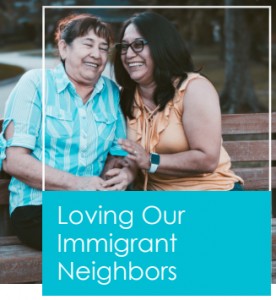 Loving Our Immigrant Neighbors (Page 4)
Loving Our Immigrant Neighbors (Page 4)
Scripture repeatedly makes clear that immigrants must be treated with dignity. Policies that rip children from their parents’ arms, lock people away in inhumane conditions, and ban desperate families from entering the country
should keep us awake at night. As people of faith, we believe that the way we treat our immigrant neighbors is a sign of how we treat God.
Questions for Reflection and Candidates
- How can we replace immoral immigration policies that tear families apart and cause trauma with an immigration system that values families and affirms the dignity of allv people?
- What can we do to heal the wounds inflicted on immigrant communities by political rhetoric that portrays them as a dangerous “other?”
- If there are immigrants in our community who are feeling isolated and under threat, how can we show support and build connections?
- As a candidate, what will you do to defend the dignity of all immigrants, and how will you further policies that keep families together?
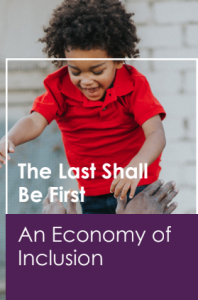 The Last Shall Be First An Economy of Inclusion (Page 5)
The Last Shall Be First An Economy of Inclusion (Page 5)
Our economic systems should work for all Americans, not only the wealthiest few. This is a matter of justice and
human dignity. All religious traditions recognize that charity is essential to care for the most vulnerable, but helping our neighbors in poverty also compels us to address its root causes. “Charity is no substitute for justice withheld,” St. Augustine observed centuries ago.
Questions for Reflection and Candidates
- What can we do to ensure that all Americans are able to provide for their families and live with security and dignity?
- How do we create a just tax system that is fair to all Americans, including working families who are trapped in poverty?
- Why does the United States lag behind most developed countries when it comes to providing paid sick leave and paid family leave?
- As a candidate, what are your specific plans to ensure workers have living wages and economic security while the coronavirus pandemic continues, as well as for the long term?
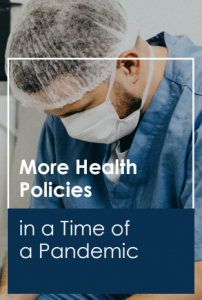 More Health Policies in a Time of a Pandemic (Page 7)
More Health Policies in a Time of a Pandemic (Page 7)
Despite our nation’s stated values of life and equality, the United States is the only industrialized country in the world that does not guarantee its residents universal access to health care. This is a failure of political and moral imagination – especially in a time of pandemic.
Questions for Reflection and Candidates
- How can people of faith be most effective in using our stories, congregations and power to advocate for health care reform?
- What do you struggle with the most when it comes to our healthcare system?
- How has the COVID-19 crisis impacted your community? What policy solutions can keep us all safe and remedy racial and economic inequalities in your community?
- As a candidate, what are your specific plans for making sure that quality,
affordable health care is available for all?
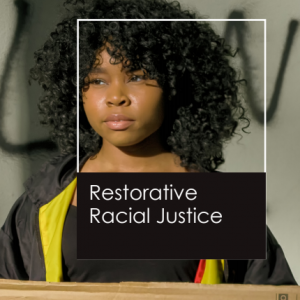 Restorative Racial Justice (Page 9)
Restorative Racial Justice (Page 9)
Justice and redemption are at the very heart of faith. Restorative justice begins with listening to and empowering communities that have been exploited, excluded and denied equal representation and freedom. The evil ideology of
white supremacy shaped our nation from its founding and continues to impact policies and communities today, especially in the criminal justice system. The killings of Ahmaud Arbery, Breonna Taylor, George Floyd and so many other Black people, Indigenous people, and other people of color, has provoked a growing, multi-racial moral movement for accountability and systemic reforms for racial justice.
Questions for Reflection and Candidates
- How can we dismantle the evil ideology of white supremacy in our culture and political systems?
- What can be done to end racial profiling and police violence against people of color?
- What steps can be taken to ensure formerly incarcerated people have voting rights and fair access to employment?
- As a candidate, what will you do to ensure racial justice is prioritized in the criminal justice system?
- How do we build safe communities for everyone, particularly people of color?
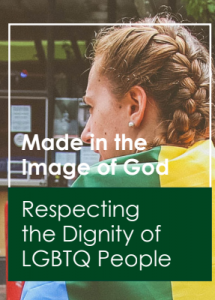 Made in the Image of God: Respecting the Dignity of LGBTQ People (Page 11)
Made in the Image of God: Respecting the Dignity of LGBTQ People (Page 11)
All people have inherent dignity because everyone is created in the image of God. Our gay, lesbian, bisexual and transgender family members, neighbors and co-workers deserve equal rights, and to live without fear or discrimination.
Questions for Reflection and Candidates
- How can your faith community more fully support the equal dignity of LGBTQ people in your state and local area?
- What are the greatest threats to LGBTQ people in your community and the nation?
- As a candidate, what are your specific plans to ensure that LGBTQ people have equal rights and are treated with dignity
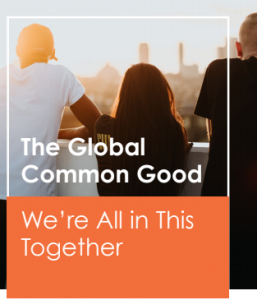 The Global Common Good: We’re All in This Together (Page 12)
The Global Common Good: We’re All in This Together (Page 12)
What does it mean to love our neighbors as ourselves in a globalized world? The health and future of our country and
communities are interconnected to the health and security of other nations. Our fates are bound up in what Rev. Martin Luther King, Jr., called “an inescapable network of mutuality.”
Questions for Reflection and Candidates
- What policies do you think are most important for creating security for your family and community?
- What role should the United States play in the world to help build global peace and security?
- How can your faith community advocate for policies to create a more peaceful world?
- As a candidate, what programs and policies would you prioritize to help build secure communities and a peaceful world?

IPL New Mexico-El Paso, Citizens Caring for the Future Join 27 Other Groups in Petition to Governor
/in Faithful Citizenship, Featured Articles, NEWS, NM Legislature, NMIPL in the News, Permian Basin /by adminIPL New Mexico & El Paso and Citizens Caring for the Future were among a group of 29 environmental and civic organizations signing a letter to Gov. Lujan Grisham urging her to line-item veto parts of House Bill 252 that would create an oil and gas severance tax exemption for “stripper well properties” for the costs of complying with the state’s 2021 methane waste rule and 2022 ozone precursor rule. If signed into law, this bill would perversely give companies a tax break for costs incurred to protect the public against hazards of these businesses’ own creation.
We adapted the above paragraph from an article written by The Western Enviromental Law Center. Here is the rest of the piece
“In its analysis, the New Mexico Legislative Finance Committee found the exemption could cost the state $17.2 million in revenue between fiscal years 2025 to 2028, reduce bonding capacity by $18.8 million over the same time period, increase the Oil Conservation Division’s annual operating costs by $200,000, and require two new full-time-equivalent OCD employees. This tax giveaway to oil and gas operators therefore comes at the expense of the severance tax’s permanent fund and agency capacity at the precise time the state should be leveraging its resources to prepare for the inevitable decline of oil and gas revenue and production.
“House Bill 252’s oil and gas severance tax exemption reflects well-founded public concerns that the political deck is decidedly stacked in favor of the oil and gas industry, not the people of New Mexico,” said Erik Schlenker-Goodrich, executive director of the Western Environmental Law Center. “The oil and gas industry secured this severance tax exemption in the shadows while gutting sensible oil and gas reforms backed by the Lujan Grisham administration and other state officials. Line-item vetoing HB 252’s oil and gas severance tax exemption provides Gov. Lujan Grisham with an opportunity to stand strong for the people of New Mexico.”
Several state agencies expressed concern with the severance tax exemption:
“A fundamental economic principle is businesses should bear the external social costs they create,” said Kayley Shoup, community organizer for Citizens Caring for the Future. “Oil and gas operators—not the public—should pay the compliance costs of reducing methane emissions from oil and gas operations to protect our climate and to reduce toxic air pollutants that harm public health. A tax break to the industry that is polluting the air where my neighbors and I live in the Permian Basin is simply not warranted.”
The groups signing on to the letter include the Western Environmental Law Center, 350 New Mexico, Albuquerque Unitarian Universalist Fellowship, Center For Civic Policy, Chaco Alliance, Citizens Caring For The Future, Earth Action, Inc., Earthworks, Environmental Defense Fund, FracTracker Alliance, Indivisible Albuquerque, League Of Women Voters New Mexico, Moms Clean Air Force New Mexico Chapter, New Energy Economy, New Mexico Climate Justice, New Mexico Interfaith Power And Light, New Mexico Sportsmen, New Mexico Voices For Children, New Mexico Voters For Children Action Fund, New Mexico Wild, Progressive Democrats Of America – Central New Mexico, ProgressNow New Mexico, Prosperity Works, Rio Arriba Concerned Citizens, Rio Grande Indivisible, New Mexico, San Juan Citizens Alliance, See (Social Eco Education), and WildEarth Guardians.”
IPL New Mexico-El Paso Roundhouse Report
/in Faithful Citizenship, Featured Articles, NEWS, NM Legislature /by adminWe are called to love creation.
We are grateful for all who worked so hard, and prayed for so many concerns during the legislative session that ended February 15.
While the session is over, our work is not over.
Overview of some of the areas and bills IPL followed
(and many of you worked for during the 30-day budget session).
Appropriations and bills related to environment, environmental health and climate that PASSED
Tax package Feeder Bills that included funding for Numerous Tax credit bills for solar, energy storage, clean cars, geothermal and energy storage.
HB 41 -Clean Transportation Fuel Standards
HB 177 NM Match Fund
HB 5 Workforce Development & Apprenticeship Fund
CS/ HB 211/a Water Project Prioritization
Bills related to environment, health and climate that did not make it through
We all continue to work in these areas throughout the year and into the future for our communities and young ones as we strive to care for our sacred land, water, air and communities.
HB 133 Oil & Gas Act Changes –reform for financial assurances and codifying methane rules in New Mexico
Bills to increase bonding through increased royalties in oil and gas industry on state land
Memorial to study setbacks in oil and gas industry related to human and environmental health
SB 79 Statewide Composting Program
Pollinator protection
HB 104 Statewide Public Health and Climate Program
HJR4 and SJR8 NM Green Amendment
Sierra Club Summary of State Legislative Initiatives Related to Climate
/in Faithful Citizenship, Featured Articles, NEWS /by adminHere is a Legislative Summary courtesy of Camila Fiebelman, Rio Grande Chapter of Sierra Club.
Here’s some of the good stuff that passed!
(Click on Bill Number for details)
HB 41
CLEAN TRANSPORTATION FUEL STANDARDS
Ortez/Stewart
HB 91
GEOTHERMAL RESOURCES PROJECT FUNDS
Roybal Caballero/Ortiz y Pino
*HB 177
NM MATCH FUND
Dixon/Campos
HB 5
WORKFORCE DEVELOPMENT & APPRENTICESHIP FUND
Garratt/Padilla
SB 169/a
LAND & WATER CONSERVATION FUND CHANGES
Stewart
CS/ HB 211/a
WATER PROJECT PRIORITIZATION
Herrera
HB 252
ADJUST INCOME TAX BRACKETS (TAX PACKAGE See Feeder Bills Below)
Lente/Shendo
TAX PACKAGE FEEDER BILLS
Tax Credits in the package we support:
SB 315
CREATING THE CLEAN CAR INCOME TAX CREDIT
Tallman
HB 140
CLEAN CAR INCOME TAX CREDIT
Hochman-Vigil
SB 121
SOLAR MARKET DEVELOPMENT TAX CREDIT CHANGES
Stewart
SB 282
ELECTRICITY GENERATION TAX SUNSET
Wirth
HB 118
ELECTRIC GENERATION TAX SUNSET
Ortez
HB 274
ADVANCED ENERGY EQUIPMENT TAX CREDIT
Serrato
SB 316
CREATING THE ADVANCED ENERGY EQUIPMENT INCOME TAX CREDIT
Shendo
HB 143
ENERGY STORAGE FACILITY IRB ELIGIBILITY
Chandler
SB 232
ENERGY STORAGE INDUSTRIAL REVENUE BONDS
Wirth
HB 92
GEOTHERMAL ELECTRICITY GENERATION TAX CREDITS
Roybal Caballero
SB 58
GEOTHERMAL ELECTRICITY TAX CREDIT
Ortiz y Pino
SB 40
GEOTHERMAL HEAT PUMP TAX
Soules
Tax Credit in the package we oppose:
SB 64
SEVERANCE TAX EXEMPTION FOR CERTAIN PROJECTS
Ron Griggs
HB2 – Budget Victories
HB 2
GENERAL APPROPRIATION ACT OF 2024
Nathan P. Small
$300M for the Conservation Legacy Fund
$75M for the Match Fund
$10M for the Climate Investment Center
$7M for Surface and Ground Water Permitting Programs
Thanks to all of the legislators who work so hard to move complex issues forward in ways that are more complex than any of us can imagine.
Thanks to all of the organizations, leaders, and advocates who make this work possible by sharing your knowledge, expertise and passion for working together to protect our kids, families, communities, air, water, land and climate.
We will continue to weave an abundant future together.
With all our love,
Your Sierra Club Rio Grande Chapter Lobby Team